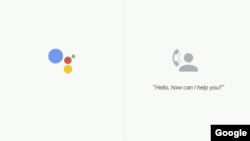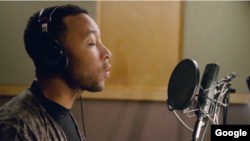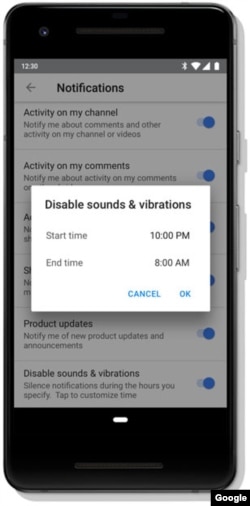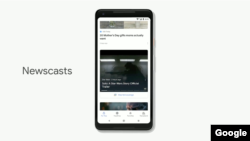Google announced new features to make devices smarter and more useful to open its yearly developers’ conference. The announcements came at Google’s I/O 2018 conference in Mountain View, California.
We put together a list of 10 of the top new features. Most will be released soon or throughout the summer. All are powered by Google’s ever-developing artificial intelligence or AI technology.
Google Duplex
One of the most talked about events was when Google chief Sundar Pichai demonstrated how the company’s digital assistant had set a haircut appointment for someone all by itself.
“So what you're going to hear is the Google Assistant actually calling a real salon to schedule the appointment for you.
Hello, how can I help you?
Hi, I’m calling to book a women’s haircut for a client. I’m looking for something on May 3rd.
Sure, give me one second.
Mm-hmmm.
That was a real call you just heard.”
Pichai said the demonstration was the result of the company’s research and development over many years in the areas of natural language, deep learning and text-to-speech. Google calls the technology Duplex. The idea is to create machines that sound and act more human-like in interactions with people.
New Voices
Pichai announced that six new voices are being added to Google Assistant, including one based on singing star John Legend.
“John Legend’s voice will be coming later this year, so that you can get responses like this. ‘At 10 a.m. you have an event called Google I/O keynote. Then at 1 p.m. you have margaritas. Have a wonderful day.’ I'm looking forward to 1 p.m.”
The company also announced that by the end of 2018, Assistant will support 30 languages in 80 countries.
Pretty Please
Google says it had received some reports that parents did not like the way their children sometimes spoke differently to the Assistant than they would to them. So engineers designed a way for children to receive digital praise when they act politely.
“Tell me a story please.
Thanks for asking so nicely. You’re very polite.
I know.”
Continued Conversation
Another new feature related to Assistant is called Continued Conversation. Until now, users have had to say “Hey Google” each time they asked a question or wanted help. But now, a user can issue more than one command – such as a follow-up question – for up to eight seconds, and Assistant will answer.
Google Maps - Augmented Reality
Google will now include augmented reality to help guide users. In Google Maps, people can look through the device camera and get turn-by-turn directions while viewing the actual street. The feature will also use local landmarks and buildings captured by the camera to help guide the trip.
Gmail Smart Compose
The latest new tool for Gmail is an autocomplete feature called Smart Compose. It uses AI to suggest ways to finish sentences as they are written. For example, “I haven’t seen you” might be autocompleted to “I haven’t seen you in a while and I hope you’re doing well.”
Digital Wellbeing
Google says it recognizes many users are trying to find the right balance in life with technology. Sometimes they would like to break away from their devices to be able to spend time “on better things.” New features with this in mind can help users prevent overuse of technology.
A Dashboard will provide users detailed information about how much time they are spending on which parts of their device. When the device is placed face down, a new feature will put the device on hold and silence it so the user can center on other things. A Wind Down Mode feature can let users enter the time they want to go to bed. At that time, the device will again go silent and the front of the device will dim to help users disconnect before bed.
Google Photos
There are several new changes to Google Photos. When one feature recognizes a photo of someone in a user’s contact list, it can suggest sending the photo to that person. It can also change photos to PDF files, and automatically add color to black-and-white photos, or make part of a color photo black and white.
Google News
Google is redesigning its news presentation in a way it says will make it easier for users to keep up with the news they are most interested in. The Google News app will present five top stories, plus others it thinks will be of most interest to the user.
A new feature is called Full Coverage, which Google says provides a complete picture of a single story, from various sources and formats. Another is called Newscasts. This gives users a preview of a story, and lets them decide where to go from there.
Google engineer Trystan Upstill introduced the new tools.
“Our AI constantly reads the firehose of the web for you, for millions of articles, videos, podcasts and comments being published every minute."
Android P
The Android P version of Google’s Android operating system will include more powerful AI tools. One will let the battery learn over time how people use their apps and then adapt in an effort to save power. Adaptive Brightness will learn and make changes in a similar way. It will learn from the level of brightness in the environment, as well as settings changed by users over time.
I’m Bryan Lynn.
And I'm Ashley Thompson.
Bryan Lynn wrote this story for VOA Learning English, based on information from Google and reports from the Associated Press. Hai Do was the editor.
We want to hear from you. Write to us in the Comments section, and visit our Facebook page.
______________________________________________________________
Quiz
_____________________________________________________________
Words in This Story
feature – n. an interesting or important part, quality, ability, etc.
artificial intelligence – n. the ability of a machine to reproduce human behavior
digital – adj. using or involving computer technology
salon – n. a shop where people go to have their hair cut or appearance improved
polite – adj. behaving in a way that is not rude and shows a person is not only thinking about themselves
augmented reality – n. an enhanced version of reality created by the use of technology to add digital information on an image of something
dim – v. make less bright
format – n. the form, design, or arrangement of something
hose – n. long, usually rubber tube through which liquids or gases can flow












